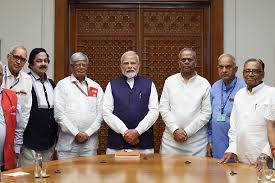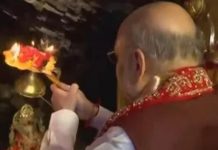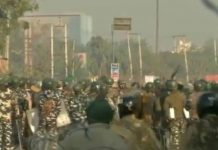Just ahead of the upcoming assembly polls in Haryana, J-K, Maharashtra, Bihar, Jharkhand and Delhi, PM Modi announced the Unified Pension Scheme (UPS) with slight tweaks in NPS for the government staff, overlooking their long pending demand for OPS restoration, writes Mudit Mathur

Just ahead of the upcoming assembly elections in Haryana, Jammu and Kashmir, Maharashtra, Bihar, Jharkhand and Delhi, Prime Minister Narendra Modi announced the Unified Pension Scheme (UPS) with slight improvements in the New Pension Scheme (NPS) for the central government and Railway employees from the next financial year, but did not accept their long pending demand to restore non-contributory Old Pension Scheme (OPS). The Maharashtra government has adopted it while other BJP-led state governments are likely to adopt it soon.
OPS had become a major poll issue in the state elections and BJP faced many electoral reversals on this count. The tremors were also seen in the huge parliamentary losses. The Congress-led state governments have already restored OPS as a part of their poll promises. The Unified Pension Scheme (UPS) is contributory; however, the old one was non-contributory. Many federations have outrightly rejected UPS reiterating their demand for OPS while announcing their decision to intensify the agitation in a big way.
Prime Minister Modi, while praising the UPS, stated in a post on ‘X’ sharing photographs of meetings with employee leaders, “We are proud of the hard work of all government employees who contribute significantly to national progress. The Unified Pension Scheme ensures dignity and financial security for government employees, aligning with our commitment to their well-being and a secure future.” “Met a delegation of staff from the Joint Consultative Machinery for Central Government employees. They expressed joy over the Cabinet’s decision regarding the Unified Pension Scheme.”
The Joint Consultative Machinery (JCM), the apex body representing Central government employees, lauded the newly launched UPS by the Modi government but many other federations of employees, including the All-India Defence Employees Federation (AIDEF), have refused to accept the UPS as the second Contributory Pension Scheme and declared to continue struggle till achieving Non-Contributory Pension Scheme –– OPS.
Shiv Gopal Mishra, secretary of the Joint Consultative Machinery (JCM), a joint forum of government employees’ organisations, said they were invited by the prime minister for the meeting. He added that the Prime Minister acknowledged their concerns after days of protest. “This was for the first time that JCM was invited by the PM. It was a very good meeting. It was a very proud moment for 32 lakh government employees,” an overwhelmed Mishra told Tehelka.
The National Council (Staff Side) of JCM had submitted 14 demands in a letter to Prime Minister Modi covering various pending issues related to central government employees, including a demand that the Centre must cut-short the period for restoration of the commuted portion of pension to 12 years from the existing 15 years. The National Council JCM is the highest consultative forum of the central government employees of which the Cabinet Secretary is the chairman.
AIDEF president S.N. Pathak told Tehelka that our decision to boycott the NPS improvement Committee and the meeting convened by the Prime Minister has proved to be correct and justified. “We as a fighting Organisation will continue our battle for the restoration of OPS with all our strength and might. Let us continue to educate the employees and mobilise them to continue our struggle to achieve the Non-Contributory Pension Scheme under CCS Pension Rule 1972 (Now 2021),” he added.
Pathak said AIDEF will make efforts to bring like-minded Government Employees Organisations together to launch nationwide agitation for the restoration of the Old Pension Scheme. Terming UPS worse than NPS, the president of the All Teachers Employees Welfare Association (ATEWA), Vijay Kumar Bandhu, announced further protests to restore OPS.
After Narendra Modi took over as a Prime Minister for the 3rd time, on behalf of the JCM Staff Side, a memorandum was submitted to him on June 18, 2024, bringing to his notice about 14 major demands, which included setting up of 8th Pay Commission, restoration of old pension scheme, withdrawal of corporatization of ordnance factories, release of 18 months DA arrears, restoration of commuted portion of the pension after 12 years, CGHS wellness in all districts, to implement various Supreme Court judgements on service matters to the non-petitioners etc. But there has been no response to such demands from the government.
AIDEF, one of the major Central Government Employees organizations representing the Defence Civilian Employees, has boycotted the NPS improvement committee meetings since, according to them, their demand is only for the restoration of the Old Pension Scheme which is continuing on defence forces.They also demanded to withdraw the process of corporatization of ordnance factories, restructuring of DRDO & DGQA and also reduction of Manpower in MES & Navy etc.
ATEWA president Vijay Kumar Bandhu, who had spearheaded the national movement for the restoration of OPS, complains that despite many letters, the TV Somanathan Committee did not call us for any consultations. Bandhu, it may be mentioned, was the chief architect for organising historic all-India rallies in the Ram Leela ground in support of the demand for restoration of OPS. Though such rallies were blacked out in the mainstream media, it sent ripples in the political set-up.
Rejecting UPS outrightly, Bhandu told Tehelka that our executive committee has decided, “No NPS–no UPS; only OPS” is our fresh campaign which will be launched on X (formerly Twitter) for mobilisation of our cadres. All the employees will wear black stripes from 2–6 September. Thereafter, we will demonstrate at every district headquarters on 26th September and will march to the parliament house in November or December.
Congress President Mallikarjun Kharge, while reacting to the announcement of UPF, said, “The ‘U’ in UPS stands for Modi Govt’s U-turns! Post June 4, the power of the people has prevailed over the arrogance of power of the Prime Minister. — Rollback in the budget regarding Long Term Capital Gain / Indexation — Sending Waqf Bill to JPC — Rollback of Broadcast Bill — Rollback of Lateral Entry.” “We will keep ensuring accountability and protect 140 Cr Indians from this despotic government!”, he remarked.
Union Minister Amit Shah also hailed the decision, stating the Modi government has reiterated its commitment to the financial security of those who form the backbone of the nation’s governance.
Uttar Pradesh Chief Minister Yogi Adithyanath, too, welcomed the decision. “The approval given to the Unified Pension Scheme (UPS) by the Union Cabinet, under the successful leadership of Prime Minister Narendra Modi, who is continuously dedicated to making the lives of 140 crore countrymen easier, is commendable.” “This revolutionary decision, benefiting lakhs of central government employees, has brought a new sunrise in their lives with the assurance of economic security and a happy future. My heartfelt gratitude to you, Prime Minister!” he stated in a post on “X”.
While briefing the media about the Unified Pension Scheme (UPS), Union Minister Ashwini Vaishnaw announced that the newly approved UPS would provide a 50 per cent assured pension as its first pillar, and an assured family pension as its second. He said the Union Cabinet, chaired by Prime Minister Narendra Modi, approved the Unified Pension Scheme (UPS).
Elaborating salient features of the UPS, Vaishnav said that the assured pension would be 50% of the average basic pay drawn over the last 12 months before superannuation for a minimum qualifying service of 25 years. This pay is to be proportionate for a lesser service period up to a minimum of 10 years of service. The scheme envisaged an assured family pension: @60% of the pension of the employee immediately before her/his demise.
It further provides an assured minimum pension: @10,000 per month on superannuation after a minimum of 10 years of service. Besides inflation indexation: on assured pension, on assured family pension and assured minimum pension. Dearness relief will be provided on the All-India Consumer Price Index for Industrial Workers (AICPI-IW) as in the case of service employees. lump sum payment at superannuation in addition to gratuity 1/10th of monthly emoluments (pay + DA) as on the date of superannuation for every completed six months of service. This payment will not reduce the quantum of assured pension. Additionally, there will be an option for employees to choose between the existing National Pension System (NPS) and the new UPS.













